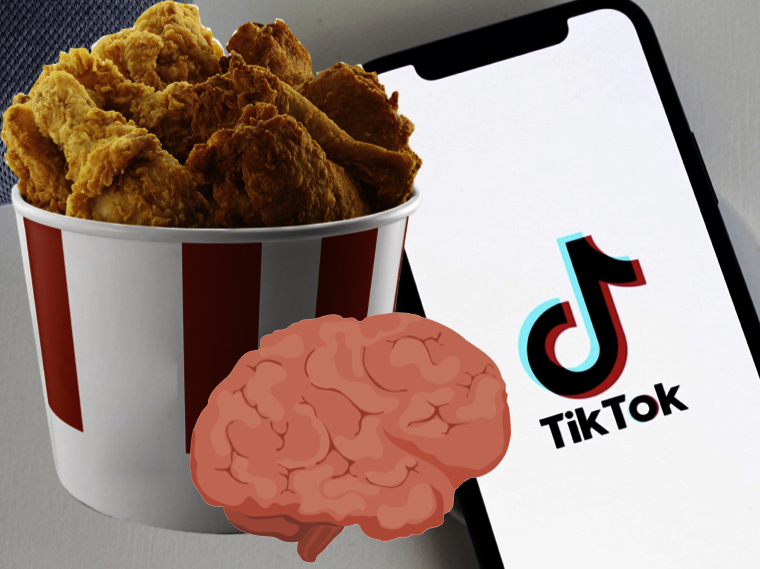
The modern world is a place of overstimulation and overconsumption.
Our environment primes us to seek out instant gratification. We are easily swayed by what is happening in the present, particularly the powerful forces of social media.
Don’t want to feel the pain of doing your work?
Don’t feel like sitting with uncomfortable thoughts and feelings?
No problem!
You can go on TikTok for instant relief.
But the problem with TikTok (and all forms of social media) is that it’s like KFC for the human brain.
It delivers short-term rewards that create long-term costs.
Think of it like this . . .
Those 15 second attention grabbing videos are like deep fried little treats.

And TikTok is an all you can eat buffet where the food has been engineered to give you a massive hit of dopamine. This dopamine-rich food environment is within arms reach and it never runs out. You can eat as much as you want, whenever you want.
The team of TikTok chefs and food engineers are constantly adding more and more greasy food creations to the buffet. With each day that passes, the food options become more novel and extreme (deep fried spam and cheese covered in panko crumbs, anyone?).
But here’s the really creepy part . . .
Because you frequent the buffet multiple times per day, the staff get to know exactly what you like. They know your name, where you live, what you like and don’t like, and the places you like to visit. This means they serve you food that hits the sweet spot every time.
In other words, this machine knows you better than you know yourself.
It’s highly addictive.
It’s easily accessible.
And it’s making you sick.
As Matthew Crawford states in his book The World Beyond Your Head: On Becoming an Individual in an Age of Distraction:
“The media have become masters at packaging stimuli in ways that our brains find irresistible, just as food engineers have become expert in creating “hyperpalatable” foods by manipulating levels of sugar, fat, and salt. Distractibility might be regarded as the mental equivalent of obesity.”
Here’s the thing . . .
You may have noticed that the more you consume from the TikTok buffet, the less you enjoy it. But even though you don’t enjoy it, you can’t stop going back for more. You keep piling your plate with more sickening fried food.
The problem is your brain hasn’t evolved to handle this massive amount of useless content hitting you at such fast rates (with no stop mechanisms in place).
Without good strategies in place to protect yourself, you’re at serious risk.
Your ability to focus and think deeply about who you are and what you want from life will be diminished.
In addition, when you’re constantly bombarded with highly curated, beautiful images of people who have more and better stuff than you, your perception of reality becomes distorted.
As Dr Anna Lembke states:
“We’re now comparing ourselves not just to our classmates, neighbors, and co-workers, but to the whole world, making it all too easy to convince ourselves that we should have done more. Or gotten more, or just lived differently.”

Social media influencers have a lot to answer for. These people set fake, wildly unrealistic standards which no one can live by. They can’t even live by the ridiculous standards they set and promote.
It’s these impossible standards that are making so many people feel anxious, depressed and insecure.
In fact, studies show young people are getting more plastic surgery due to the pressure from social media.
In short, TikTok is making our brains, thinking, and expectations go haywire.
Recalibrate your brain
If your TikTok use has got out of control, never fear. The human brain is super adaptable. You can reset things, so you feel less anxious and more in control.
How do you do this?
One way is to engage in a Dopamine Fast.
A Dopamine Fast involves giving your brain a break from constant overstimulation by avoiding all technology (e.g., phone, video games, and social media) for a period of time. Start with just 24 hours.
You might be thinking, “Well, that sounds boring! Why would I want to do that?”
But as Dr Anna Lembke states in her book Dopamine Nation:
“Boredom is not just boring, it can also be terrifying. It forces us to come face-to-face with bigger questions or meaning and purpose. But boredom is also an opportunity for discovery and invention. It creates the space for new thoughts to form, without which we’re endlessly reacting to stimuli around us, rather than allowing ourselves to be within our lived experience.”

Challenge yourself to take a break from the TikTok buffet and be alone with your thoughts and feelings. Notice what comes up for you as you don’t go on your phone (Boredom? Anxiety? FOMO? Freedom?)
It’s a good idea to write down or draw out what you experience on your Dopamine Fast.
After the Dopamine Fast is over, before you quickly run to the TikTok buffet, ask yourself this:
Am I fully in control of my brain?
Or has TikTok hijacked my attention?
If you do choose to go back on TikTok, you need to put limits in place. Easier said than done, right?
It’s your brain up against a big machine of industrialised persuasion.
This is why the Chinese government heavily regulates TikTok. If you’re a teenager in China, here’s how TikTok works:
• You can only use it for 40 minutes a day
• It has opening and closing hours (it opens at 6am and closes at 10pm)
Until our governments start to seriously regulate big tech companies, here’s what I recommend you do:
Delete TikTok.
Because let’s be clear: TikTok does not have your best interests at heart.
